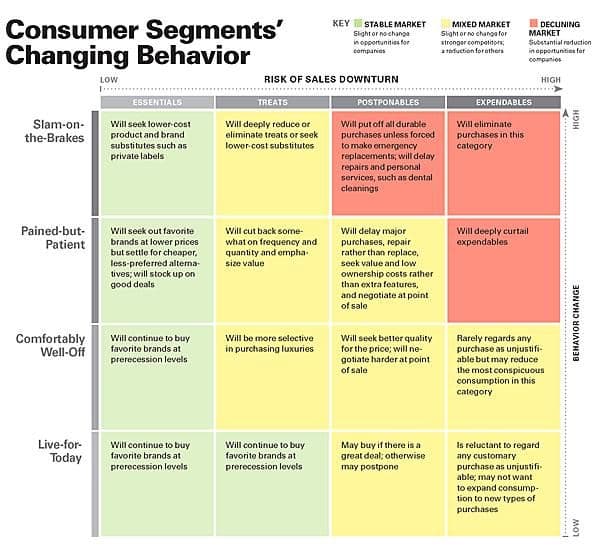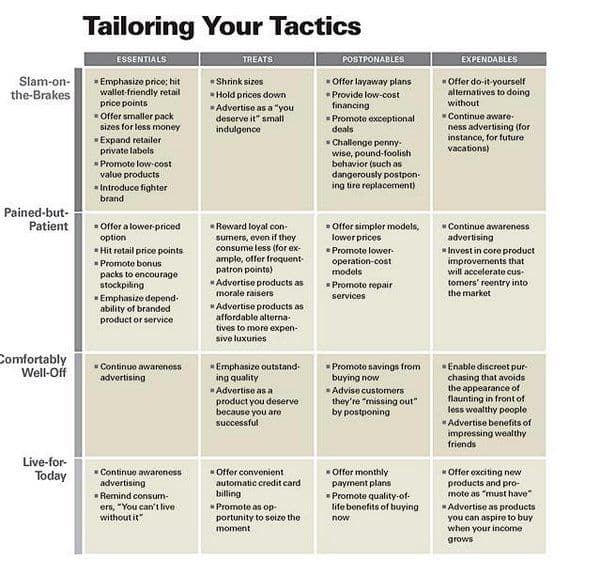
Financially, there are challenging times ahead for everyone. The mix of high interest rates, rising living costs, and a looming recession is affecting both people and businesses, causing them to take serious measures to reduce costs where they can. During challenging times, reviewing, and stopping all non-essential expenditure is a given, but the problem escalates when essential opportunities for exposure and growth (like advertising and marketing) are the subject of cost-cutting too. This is a risk for businesses. Reducing your marketing activity and simply relying on sales to hopefully come in might work for your business, but what if it doesn’t? What if sales stop? In this article, we explore why continuing to put a budget into marketing will help your business survive challenging periods and, often, help it thrive on the back of them.
The impact of recessions on customers
All recessions are unique, but they do share common traits:

Customer confidence plummets, which leads to customers reducing spending. They may use some of their disposable income, but it will be significantly reduced, and they will be pickier about the brands they spend with i.e., the ones they trust the most and feel they get the best value from.

Unemployment goes up.

Credit is harder to obtain.

Businesses make reductions.

There’s generally less cash to go around, and less cash flows between customers and businesses and from business to business.
This all results in one big cycle of people spending less, businesses cutting costs and prices, and investment being halted. Plus, when businesses cut costs, it’s often their marketing and advertising budget that is the first to go.
While this sounds logical. It is actually the opposite approach to what businesses should be doing during a downturn.
According to research conducted by the Harvard Business Review, published after the last recession:
“In past downturns, consumer goods companies that were able to increase share of voice by maintaining or increasing their advertising spending, captured market share from weaker rivals”.
If your competitors cut back on their digital marketing, your space becomes less competitive. In the pay-per-click space, there will be fewer businesses bidding on ads, bringing the cost per ad down. Plus, a customer’s choice is simplified as they will be seeing ads by fewer brands. Your customer acquisition cost will be less. If your business continues digital marketing activity when your competitors cut back, you will have increased your market share.
The same applies to search engine optimisation (SEO) and social media marketing. Businesses that pause their campaigns or reduce budgets will lose search rankings or become taken over by their competitors’ growing channels.
What can (and should) businesses be doing?
Before taking action, you’ll first have to decide how deeply your customers and your business will be affected by the recession. For example, no manner of marketing activity would have saved an estate agent during the onset of the Great Depression where the building of new homes came almost to a halt, repairs were left unfinished, and so many people lost their homes due to foreclosure. In comparison, most present-day businesses should be relatively safe, and should start to think about:
- 1
How your customer’s behaviours have changed.
- 2
How your business and marketing should be positioned.
Re-profile your customers
You may already have a good grasp of your ideal customer profile, but buying habits change so you’ll need to understand these. In the earlier linked article by the Harvard Business Review, consumers are categorised into four possible groups:
- 1
Slam-on-the-Brakes
- 2
Pained-but-Patient
- 3
Comfortably-Well-Off
- 4
Live-for-Today

- 1
Slam-on-the-BrakesThis group of consumers will literally “hit the brakes” on their spending when times get tough. They tend to be on very low incomes (or just very ‘nervous to spend’) and, therefore, they will limit their spending immediately and drastically.
- 2
Pained-but-Patient
This group will have an optimistic view of the future but are less confident with their spending than they usually would be. They won’t cut their spending altogether but will be more considered and cautious with their approach. This group will still be open to advertising and marketing, but the message needs to reassure them that your products and services will offer stability to their needs in the here and now. - 3
Comfortably-Well-Off
The comfortably well-off group will feel secure in the current market and their long-term future. They will keep spending but could possibly be choosier with their purchases. This group can be marketed to in a similar way as in non-recession periods, with the exception being that they will likely remain loyal to reliable brands they trust. - 4
Live-for-Today
With this group, continue as you are. They will be unconcerned by the prospect of a recession. Even if it could affect them, it will not be a problem to them. They will typically be young, city-living, and carefree. They’re here to simply live life and worry about money security further down the line in the future, not today.
Once you understand your customer’s changing behaviour, you can tailor your tactics and marketing messaging accordingly.
Marketing during a recession
During downturns, businesses must balance out marketing efforts with reducing costs and supporting short-term sales with some long-term brand investment. Streamlining product portfolios, improving affordability, and bolstering trust are three effective ways of meeting these goals. Our linked article by the Harvard Business Review takes a detailed look at how to appeal to each customer segment:

To recap – don’t do what you’ve always done
Push forward with your marketing. If you don’t, your competitors will. However, don’t rely upon the marketing strategy you have previously executed. Be sure to review and reposition if necessary. Review what has changed in your arena, examine how your customers might have changed their purchasing habits, and then adapt your strategy and message accordingly.
If you’re unsure about your digital marketing, our team will be happy to help you. Together we can create a strategy that will secure you the leads and sales you need to help your business thrive during challenging periods.
4th October 2022
